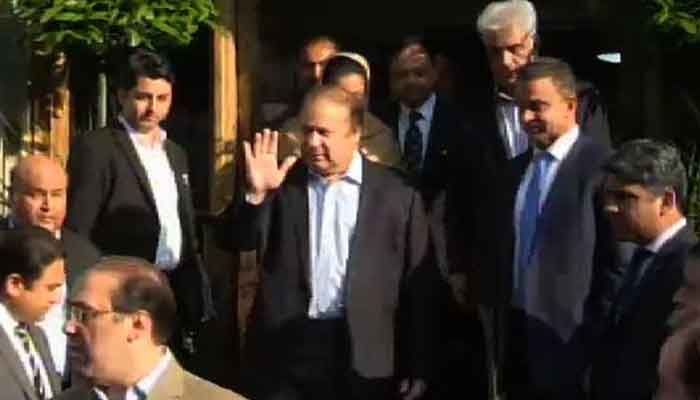Nawaz Sharif experiencing 'severe kidney pain', says Maryam Nawaz
Maryam Nawaz requests nation to pray for Nawaz Sharif's recovery as he suffers from 'severe kidney pain'
Former prime minister Nawaz Sharif could not partake in the Pakistan Democratic Movement's (PDM) latest meeting after his daughter revealed he was suffering from "severe kidney pain".
Taking to Twitter, Maryam Nawaz said that the former prime minister could not participate in the Pakistan Democratic Movement (PDM) meeting that was chaired by JUI-F chief Maulana Fazlur Rehman due to the pain.
"MNS could not participate in the PDM meeting today because of severe kidney pain that he is being treated for therefore I am representing him. Would request for prayers," she tweeted.
Geo News reporter Murtaza Ali Shah tweeted that according to hospital sources, Nawaz had undergone CT Scan and blood tests. "He has kidney stones for which he is being treated," tweeted Shah.
Earlier this year, medical records from a UK hospital showed that Nawaz was suffering from various ailments, including a severe cardiac disease.
The Royal Brompton Hospital had issued three reports: Rubidium Cardiac PET-CT scan on three pages; Holter Analysis on 16 pages; and Echocardiogram on three pages.
Separately, Dr David Lawrence had also issued a medical summary based on reports by the Royal Brompton and Guy's and St Thomas' hospitals.
The Royal Brompton reports said that Nawaz Sharif has significant areas of compromised perfusion (blood supply to heart) and there is element of impaired cardiac function as well. The reports said that the former Pakistani premier's heart is at risk of heart attack or an adverse cardiac event.
Both the Royal Brompton and Dr David Lawrence had recommended urgent heart intervention which is important for Nawaz Sharif's health and life. The reports also said that Nawaz Sharif cannot undergo the invasive procedure unless cleared by the haematologists, as his platelet counts were variable and unstable.
-
Security forces gun down 30 terrorists in multiple IBOs in KP: ISPR
-
MQM-P calls for new province in Sindh
-
US report validates Pakistan military edge over India: PM
-
Banned TTP poses serious threat to Pakistan security: UNSC panel
-
CM Afridi clarifies remarks on by-poll after ECP requests army deployment
-
Dubai sees 3.2m Pakistani passengers in 2025 as airport sets new milestone
-
Security forces kill 23 Indian proxy terrorists in KP's Kurram
-
Pakistan to construct island to boost oil exploration: report












